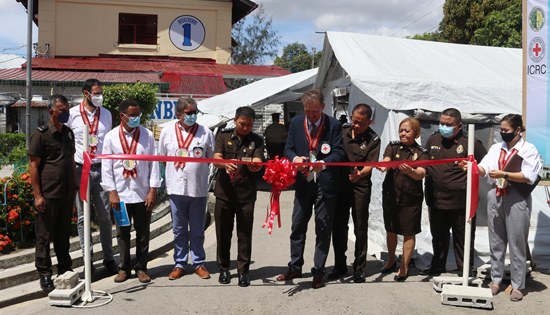Temporary
hospital at New Bilibid Prison for continued provision of health
care to 28,000 detainees
|

ICRC
Head of Delegation Boris Michel (fifth from right) and Assistant
Secretary Gabriel Chaclag (fifth from left) during the ribbon
cutting ceremony at the hospital’s inauguration. Joining them
are other ICRC and BuCor officials. |
By
ICRC
May 2, 2022
MANILA – To ensure
the continued provision of basic health-care services for 28,000
detainees in Muntinlupa City’s New Bilibid Prison (NBP), a 150-bed
temporary hospital was inaugurated today by officials of the Bureau
of Corrections (BuCor) and the International Committee of the Red
Cross (ICRC).
The 4,000 sq m temporary
facility, which was designed and built by the BuCor and the ICRC,
has an emergency room, pharmacy, intensive care unit, dental clinic
and psychiatric ward. Staffed by 147 workers, it can provide minor
surgical services to patients. It also supports the newly built
tuberculosis (TB) laboratory inside NBP by serving as an isolation
and treatment facility for patients who have tested positive for TB.
Some of the medical equipment inside the hospital have been donated
by the ICRC.
“We remain committed to
support the BuCor to guarantee the detainees’ right to adequate
health care. The temporary hospital will help improve the quality of
medical care for detainees and provide a good working environment
for NBP’s health workers,” says Boris Michel, head of the ICRC’s
delegation in the Philippines.
With the temporary
hospital, detainees will no longer have to be transported to medical
facilities outside NBP unless they have major health problems. They
will have access to its services while the BuCor builds NBP’s
500-bed permanent hospital.
The temporary hospital
will also serve as a referral facility for the infirmaries in the
minimum and medium security compounds. Prior to its construction,
detainees were treated inside medical tents.
The ICRC’s support for
detainee health care in NBP began in June 2013 with technical
assistance through monitoring, supervising and evaluating the
implementation of the national TB programme.
According to BuCor, the
NBP has a congestion rate of 348 per cent, making its detainees
susceptible to communicable diseases such as COVID-19 and TB.
“We commend the ICRC team
in the country for its very professional and collaborative approach
in the performance of its mission as an impartial, neutral and
independent humanitarian organization. Maraming salamat at mabuhay
po kayo sa ICRC!” says Assistant Secretary Gabriel P. Chaclag,
BuCor’s Deputy Director General for Administration.
The ICRC has been
supporting the NBP in its COVID-19 response through the provision of
equipment and technical support since the start of the pandemic. It
has also been assisting the NBP in the vaccination of detainees
since 2021.
The ICRC is a strong
advocate of the e-dalaw programme and announced today that it would
donate equipment that would help NBP detainees keep in touch with
their loved ones through voice and video calls.
Since 2007, the ICRC has
been working closely with the Philippine authorities to help ease
the consequences of extreme overcrowding in jails, focusing
particularly on health issues such as TB treatment, and improving
living conditions of persons deprived of liberty (PDL).